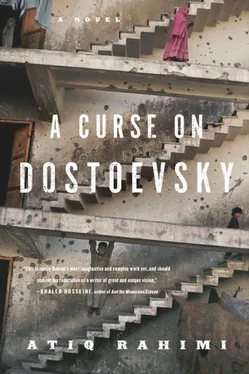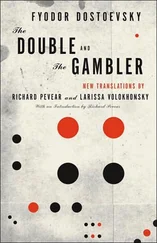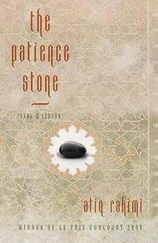“Do you know what that is?” Parwaiz replaces his pakol . “A piece of shrapnel. It’s been in my skull for years. It was during the jihad. I had come home to see my wife and son. The Russians had heard we’d come to the village, and they bombed it. Our house was hit by a rocket. A large fragment martyred my family, and a small fragment lodged itself in my skull. I never wanted to have it taken out. I wanted to live with it, so the pain would constantly remind me of my family’s death. Throughout the jihad this piece of shrapnel gave me strength, and hope. A French doctor told me that unless I had it removed, I wouldn’t live for more than ten years. But I don’t want to live for more than ten years.” A loud laugh to lighten his bitter words. “You too have a piece of shrapnel—an internal one, an internal wound, a wound that has given you strength.”
“What kind of strength?”
“The strength to live, and to create justice.”
A young man brings them breakfast. The commandant asks him for news of Jano. “No news. We still haven’t found him.”
“What do you mean? He hasn’t just disappeared into thin air! Search everywhere!”
“I bumped into him four or five days ago,” interrupts Rassoul.
“Where?”
“He invited me to drink tea with him in the Sufi chai-khana . Inside, he met some mujahideen with whom you carried out a joint operation during the jihad, against a Russian military base.”
“Can you remember their names?”
“They had served under Commandant… Nawroz, I think it was.” Parwaiz is looking more and more distressed. He tells the young man to go to the chai-khana and see what he can discover. After a moment’s thought, he continues: “Take the case of Jano. He is my adopted son. The Russians destroyed his village and massacred his family. But he has a lion’s will to survive, which stems precisely from his desire for vengeance.” He falls quiet, to give Rassoul a chance to ponder his words.
“Your wounds are wounds inflicted by others. But I inflicted my own wound. Instead of increasing my strength, it is smothering me, leading me nowhere. Sometimes, I think I wanted to murder that old woman just to find out if I was capable of killing, like everyone else…” He lowers his head. Parwaiz pours more tea and Rassoul continues, as if talking to himself: “I saw that I wasn’t cut out for it. The other day I wanted to kill someone else, and I didn’t…”
“Perhaps that person was innocent?”
“Innocent? I don’t know. But he had insulted my fiancée, chased her out of the Shah-e do Shamshira Wali mosque.”
“Is that all?” He puts the tea in front of Rassoul. “You can’t kill without a reason.”
“Perhaps I wanted to kill him in order to deal with my botched murder.”
“But that murder would have been botched, too, because you had done it for no reason.”
“I think that’s what happens. You return to a job in the hope of forgetting the previous one that you think you botched… And that is how crimes continue, in a vicious circle. That’s why I handed myself over to the law, so they could try me and put an end to all this.”
“ Watandar , you know that a trial only makes sense if there is a legal system to ensure that rights are respected. And what has become of the law and the government these days?”
“Are you, too, looking for vengeance?”
“Perhaps.”
“Gandhi used to say, ‘An eye for an eye leaves the whole world blind.’”
“He was right. But vengeance is deeply rooted in us, whatever we do. Everything is vengeance, even a trial.”
“So the war will never end.”
“Yes, it will. It will end when one camp decides to accept the sacrifice, and stop demanding vengeance. Which is why it is so important to yield, to come to terms with one’s acts, crimes, and vengeances… until one reconciles oneself with the sacrifice. But who can do that? Nobody. Not even me.”
Parwaiz understands everything. He is capable of anything. Don’t let him out of your sight. It is your job to shake him up, to return him to his mission. All he needs is a sacrifice, an accomplice. You will be that sacrifice.
“I want a legal trial. I want to be sacrificed.”
Silence, again. It is the look on Parwaiz’s face that condemns Rassoul to silence. An admiring, questioning look. Rassoul continues: “This trial will bring an end to my suffering. It will give me the opportunity to expose my soul to all those who, like me, have committed murders…”
“Stop thinking you are that Dostoevsky character, please. His act only made sense within the context of his society, his religion.”
“But what woke up the West was a sense of responsibility, deriving from a sense of guilt.”
“Mash’Allah!” Parwaiz waves his hand around, knocking over his tea. “Bless the Lord for giving them that sense of guilt, or else what would the world be!” He bursts into sarcastic laughter. “You really do want to sacrifice yourself to your fantasies.”
“I’d prefer to sacrifice myself to my fantasies than to sacrifice others. I want my death to…”
He is interrupted by a burst of gunfire, not far from the Wellayat. Parwaiz pours more tea as he waits for Rassoul to continue.
“I want my death to be a sacrifice…”
“This country doesn’t need any more deaths, any more shahids …”
“But I’ve no interest in being a shahid !”
Stop right there, Rassoul! You’ve already taken this too far.
I still have things to say to him.
Things you have said a thousand times before!
Yes, but not to him. He will be able to understand me. He knows that the existence of Allah has no need for witnesses, or martyrs.
If he knows that, there’s no point telling him. Finish your sermon: “I want my trial and my sentence to bear witness to these times of injustice, lying, and hypocrisy…”
“In that case, watandar , the whole nation must be tried.”
“Why not? My trial will be on behalf of all war criminals: communists, warlords, mercenaries…”
There is a long silence. Parwaiz has stopped drinking his tea. He is elsewhere, his gaze lost in space. A long way away, beyond even the sun that beckons at the window. Suddenly, he stands up. “Go back to your life, watandar , and your family. Get out of here! In Afghanistan this filthy war, like all wars, has its own laws and its own rules.” Rassoul stands up too: “But you are in a position to change those rules.”
Parwaiz stares at him for a long while, then holds out his hand. “When that happens I’ll let you know. Ba amané Khoda . Now go home!”
HE DOESN’T dare enter his room, on account of the little shouts and laughs emanating from it. He doesn’t dare smash the joy filling his home. Silently, he inches open the door. Yarmohamad’s daughters and two other children are playing, piling up his books to build houses. Their innocent hands waltz dolls from one story to another: “ Khala, Khala , give me a light!”
“I don’t have one, go upstairs!”
“ Khala, Khala , give me a light!”
“I don’t have one, go upstairs!”
“ Khala, Khala …”
Rassoul remains on the threshold, warmed by the children’s gaiety, unwilling to destroy this world where no one has a light. He leaves them to act out their dreams.
He goes back down the stairs. No sign of Yarmohamad, or Rona. He finds himself back in the street, where there isn’t a soul in sight. The insolent sun penetrates his skin, boils his blood, gives rise to strange emotions, strange feelings of inner desolation.
All bodies are a burdensome ruin.
Читать дальше












